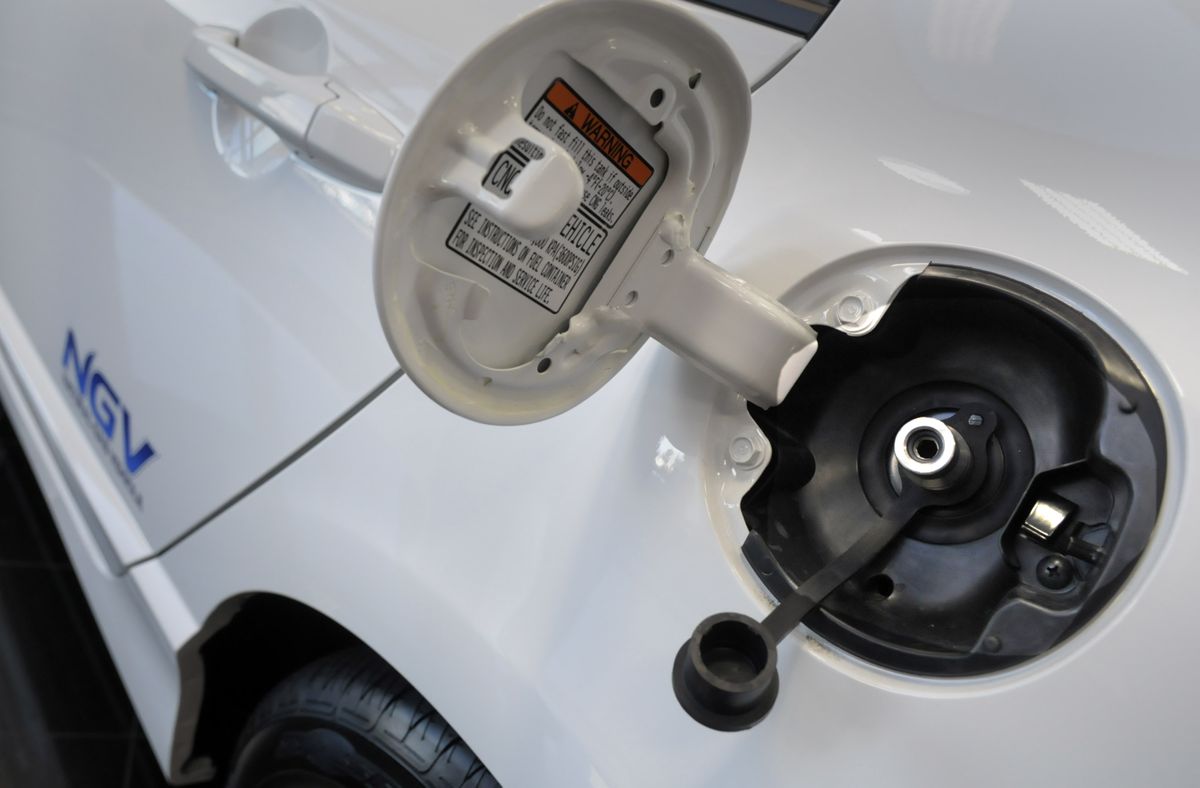Honda’s Civic GX is a car of controversy
SCC can’t get one; author says carmaker is suppressing vehicle that runs on compressed natural gas

Spokane Community College is being cited as evidence by those who believe Honda is suppressing sales of a car the federal government calls “the cleanest internal-combustion vehicle in the world.”
The college, which plans to begin training mechanics to work on hybrid cars this winter, hopes also to become a training center for those who would work on cars burning compressed natural gas, or CNG.
But while hybrids such as the Toyota Prius are common, mass-produced cars burning compressed natural gas are still so rare that the community college has spent more than a year trying to get one. Until last week, when a Honda Civic GX showed up at a Moses Lake dealership, there were none in any Eastern Washington showroom.
SCC’s prolonged effort is being cited by investigative reporter and best-selling author Edwin Black in a book about America’s reliance on foreign oil, and also in online reports for The Cutting Edge Web site. Black, who generally has high praise for Honda and drives a Del Sol, accuses the company of “suppressing proliferation” of the GX, as well as home refueling stations it sells for CNG cars.
“The Spokane area sits astride a major natural gas pipeline,” Black writes in an Oct. 20 posting on The Cutting Edge. “But Honda refused to sell even one car or any home refueling devices despite months of efforts. School officials were in disbelief, especially as the country’s fuel crisis worsened.”
Black said in an interview that the company fears Americans would stop buying more-profitable SUVs and other gas guzzlers if an alternative-fuel vehicle became widely available.
Honda’s response: “We are not suppressing sales of Civic GXs in order to sell SUVs. That’s untrue,” said spokesman Todd Mittleman, who is familiar with Black’s reporting.
Mittleman said the only thing preventing broader distribution of the GX is a lack of infrastructure, meaning public CNG refueling stations. There are none in Eastern Washington, Eastern Oregon or Idaho, and only 1,200 nationwide.
And while GXs remain in extremely short supply, the company plans to double production next year. But that still means it will make just 2,000 GXs out of more than 1 million vehicles produced.
Black heard about the college’s attempts to get a Civic GX when he came to SCC in 2007 to promote one of his books, “Internal Combustion: How Corporations and Governments Addicted the World to Oil and Derailed the Alternatives.”
SCC President Joe Dunlap said Black’s report about the college’s situation is accurate, except for Black’s contention that Honda “refused” to sell a car to the college. While Black quotes an unnamed senior SCC official saying, “They still won’t sell us a car,” Dunlap said the college never talked to dealers who had them in stock.
“The fact of the matter is that Honda has been dragging its feet in this whole issue of providing access to the CNG cars,” Dunlap said. “SCC got caught up in the middle of that.”
Dunlap said automakers sometimes provide free cars to colleges and help set up training programs. But he talked to Honda officials several times over the course of more than a year with little progress.
“Honda was supposed to come to Spokane this summer and meet with us, and they haven’t done that,” said Dunlap, adding that he’s recently had more productive talks with the company’s training department.
While millions of cars worldwide burn natural gas, most operating on American roads are after-market conversions. The Civic GX is the only one offered for sale here by major automakers.
The GX gets slightly better mileage and is more expensive than a standard Civic, but it burns much cleaner and – until the recent dramatic drop in gas prices – was much cheaper to operate. In July, when the average price of regular gasoline was above $4 a gallon, the equivalent amount of CNG cost $2.34, according to the U.S. Department of Energy. More recent figures aren’t available.
The company started offering the car for fleet purchases in 1998 and began marketing them to the general public in 2005, primarily in California and New York, Mittleman said.
“Demand has grown since gasoline prices rose, and there’s greater awareness of alternative energy options,” he said.
John Daschel, owner of Discovery Honda, said he worked for more than a year to get a Civic GX for his Moses Lake dealership. He sent mechanics to Portland and Los Angeles for training. And when the car arrived Oct. 27, he had to haul it by trailer to Bellevue to fill the tank.
Daschel, who expects to receive four more GXs over the next year, said it makes sense that his dealership would get GXs before those in Spokane because Moses Lake is within driving range of Western Washington fueling stations. Spokane is not.
Honda sells a home refueling system called the Phill that most customers buy along with their GXs. Getting one installed costs about $5,000, Daschel said.
Black criticizes Honda for not making the Phill more widely available and notes that the company recently walked away from a $17 million agreement to sell the technology to T. Boone Pickens. The Texas billionaire wanted to make home distribution of CNG part of his well-publicized plan to wean America from foreign oil.
Public refueling stations will come once the vehicles are on the road, Black said, just as Internet cafes followed home computers.
“All you have to do is put a spigot in a pipeline and open up a station,” he said.